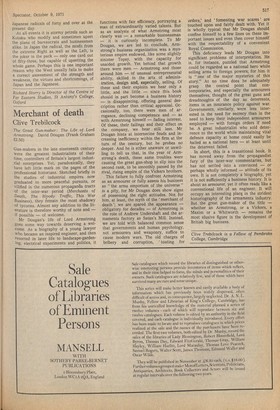Merchant of death
Clive Trebilcock
The Great Gun-maker: The Life of Lord Armstrong. David Dougan (Frank Graham £2.50) Gun-makers in the late nineteenth century were the greatest industrialists of their time, controllers of Britain's largest industrial enterprises. Yet, paradoxically, they have left little mark on the pages of the professional historians. Sketched briefly in the studies of industrial empires now graduated to more peaceful pursuits, or Vilified in the numerous propaganda tracts of the inter-war period (Merchants of Death, The Bloody Traffic, This War Business), they remain the most shadowy of tycoons. Almost any addition to the literature is therefore worthy of note and — if possible — of welcome.
Mr Dougan's life of Lord Armstrong goes some way towards deserving a welcome. As a biography of a young lawyer Who became an inspired engineer, and then resorted in later life to landscape-gardening, electrical experiments and politics, it
functions with fair efficiency, portraying a man of extraordinarily varied talents. But as an analysis of what Armstrong most clearly was — a remarkable businessman — it is curiously incomplete. To Mr Dougan, we are led to conclude, Armstrong's business organization was a mysterious empire endowed, like some slightly sinister Topsy, with the capacity for unaided growth. Yet behind that growth there were men — Armstrong and those around him — of unusual entrepreneurial ability, skilled in the arts of administration, design and, especially, selling. Of these and their exploits we hear only a little, and the little — since this book should in part become a business history — is disappointing, offering general description rather than critical appraisal. Occasionally, too, there were men of arrogance, declining competence and — as with Armstrong himself — fading interest. Of these, their failings and their effect on the company, we hear still less. Mr Dougan hints at internecine feuds and increasing inefficiency within the firm at the turn of the century, but he probes no deeper. And he is either unaware or unwilling to tell us that, in the year of Armstrong's death, these same troubles were causing the great gun-shop to slip into the second rank, to be smoothly passed by the rival, rising empire of the Vickers brothers.
This failure to fully confront Armstrong as an armourer or fully assess his business as "the arms emporium of the universe " is a pity, for Mr Dougan does show signs of possessing the right attitudes. Not for him, at least, the myth of the 'merchant of death '; we are spared the appearance — obligatory for decades — of Armstrong in the role of Andrew Undershaft and the armaments factory as Satan's Mill. Instead, we are told with balanced common sense that governments and human psychology, not armourers and weaponry, suffice to cause modern wars. The old charges of bribery and corruption, 'touting for orders,' and 'fomenting war scares' are touched upon and fairly dealt with. Yet it is wholly typical that Mr Dougan should confine himself to a few lines on these important issues and even then cover himself with the respectability of a convenient Royal Commission.
This deficiency leads Mr Dougan into significant problems of interpretation. He is, for instance, puzzled that Armstrong could be regarded as a national hero while selling arms to foreign powers; for him it is " one of the major mysteries of this story." At no time does he adequately grasp the central point that contemporaries, and especially the armourers themselves, thought of the great guns and dreadnoughts of the day as deterrents, items in an insurance policy against war. Governments, similarly, were less interested in the need for secrecy than in the need to keep their independent armourers employed — with foreign orders if need be. A great industrialist who sold deterrence to the world while maintaining vital defence capacity at home could easily be hailed as a national hero — at least until the deterrent failed.
In short, this is a transitional book. It has moved away from the propagandist fury of the inter-war commentaries, but has not settled into a convinced — or perhaps wholly informed — attitude of its own. It is not completely a biography, yet it is not sufficiently a business history. It is about an armourer, yet it often reads like a conventional life of an engineer. It will occupy an interesting place in the strident historiography of the armaments industry. But the great gun-maker of the title — whether an Armstrong, or a Vickers, a Maxim or a Whitworth — remains the most elusive figure in the development of British big business.
Clive Trebilcock is a Fellow of Pembroke College, Cambridge










































 Previous page
Previous page